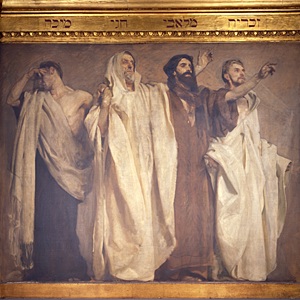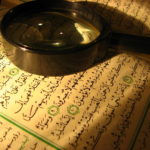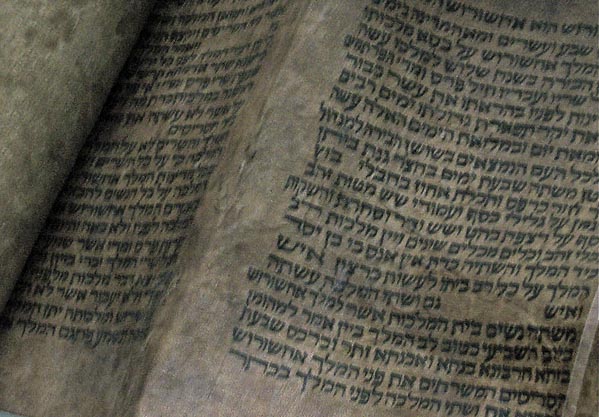
One of the more widespread accusations facing those who embark on independent reasoning and reading of the religious texts is that independent reasoning is something that has been exclusively delimited to the ‘People of the Reminder’ (or the ‘Revelation specialists’).[1]
BY OLFA YOUSSEF
NO ONE CAN DENY that anyone who reads a text, particularly if that text is ‘sanctified’, must make use of many and varied skills and methodologies. But the problem is that those who forbid others from independent reasoning are not criticising any reading on the grounds of its method or its contents or form or anything else, but rather are subjecting to criticism the very principle of reading. This means that, right from the outset, they are confiscating people’s right to read the Qur’ān specifically and other religious texts in general. To support such a confiscation they frequently adduce in their support the works of the Almighty:
Ask the followers of the Remembrance if ye know not! [Qur’ān, XVI,43]
In this article we shall not expound at length on all these questions, even if more study and analysis is indeed needed on the question of God Almighty’s addressing his discourse to all people and calling upon them – without exception – to meditate upon the Qur’ān and its verses and aver that he fears God more than his servants (the scholars) without their having to specify the source of this opinion. We shall not expand on this but instead we wish to demonstrate that the primordial confiscation of independent reasoning in reading the religious texts is something that is reliant on the above-mentioned verse. Yet in fact this is an issue that is open to discussion and revisiting the commentaries of the Qur’ān themselves concerning the expression ‘the followers of the remembrance’. God Almighty says:
And We sent not (as Our messengers) before thee other than men whom We inspired – Ask the followers of the Remembrance if ye know not! [Qur’ān, XVI,43]
The prevalent interpretation of this today is the following:
The expression Ask the followers of the Remembrance if ye know not is used to demonstrate the necessity of consulting in religious matters the views of those who, according to the community, enjoy the description of ‘Revelation specialists.’ These days among the Sunnis this description covers those whom the community view as professionals trained in legal matters. For the Shi’ites, on the other hand, such a description is applied to the Imams distinguished by a high station that holds them to partake of knowledge that others do not share. People differ as to how to define who these ‘Revelation specialists’ actually are, but their agreement upon a person or a group does allows them to expel those who are considered as not belonging to this group of specialists.
They are confiscating people’s right to read the Qur’ān
There is a possible alternative meaning according to the status of the verse. Here the discourse in the verse is directed towards the Prophet (as denoted by ‘thee’ in the phrase And We sent not [as Our messengers] before thee), and this confirms that God Almighty had sent other messengers previous to Muhammad whom He selected to receive a revelation. The verse was sent down to provide an argument against those who deny the Prophethood of Muhammad on the basis that God Almighty did not choose mere mortals as those elected to receive the message. This is how al-Tabarī relates it in his commentary on Ibn ‘Abbās:
When God sent Muhammad as the messenger the Arabs denied this to be true, and some of them said in their denial: “God is far too great for His messenger to be a mere mortal like Muhammad”.
Al-Rāzī in his work Mafātīh al-Ghayb went so far as to say that the verse refers to one of the points of doubt concerning his prophethood, as voiced by the mushrikīn:
In a fifth point of contention those who deny his prophethood say: “God is far too exalted for his messenger to be a mortal, and that if He had wished to send a message to us He would have sent a king.
So the verse therefore intends to establish to those who would deny the prophethood of the Messenger, that Muhammad’s predecessors, who were chosen by God Almighty to receive the Revelation, were themselves also mortals, and it therefore makes this case. In which case, who is more able to bear witness that the prophets preceding the messenger were mortals, other than the ‘people of remembrance’, that is, those “who have read the books that came before them: the Torah and the Gospel and other books of God which He sent down to His servants” (al-Tabarī’s commentary). The ‘people of remembrance’ may therefore be specified as the people of the Torah, in that “the remembrance is the Torah, and the proof of this are the Almighty’s words: And verily we have written in the Scripture, after the Reminder [Qur’ān XXI,105] (Al-Rāzī’s commentary). The meaning of the ‘people of remembrance’ may be generalised as being “the annalists of those that came before us, in that the scholar of something is one who ‘recalls’ it” (Al-Rāzī’s commentary).
One must always be deeply aware that ‘recollection’ and scholarship are relative terms
The important issue is that the Revelation specialists are not necessarily the subject of interpretive dispute as we see these days amongst some Muslims. The Revelation specialists are not those that are considered to be so by the Sunnis or the Shi’ites or by the proponents of any of the religious denominations. Instead, the Revelation specialists are those whose standpoints and readings happen to meet with the approval of these groups, while their denomination as ‘people of remembrance’ may just as well be withdrawn if they suggest readings that differ from theirs. What is important here is that the Revelation specialists, whom the Qur’ān bids us consult, are connected in this negating statement [2] to a specific, historical context and place.

Suggested Reading
If it be said that the specific context of the revelation of the verse does not rule out the possibility of a general reading for it, our response is that we do not deny this. We see that it is entirely permissible to extract the verse from its context and speak of the need to ask the Revelation specialists, that is any scholars, whenever an answer appears intractable or where there is a scarcity of knowledge. Despite it being a self evident matter, like saying a person should drink when he is thirsty, nevertheless one must always be deeply aware that ‘recollection’ and scholarship are relative terms, subject to the perspectives of a time or a place, or some specific considered viewpoint. This awareness of the relative nature of human reading is the only means towards opening up the doors to reform, dialogue and independent reasoning.
[1] The author’s term is ahl al-dhikr, which literally means ‘People of the Reminder’. The term is difficult to translate since its meaning varies with the context. It has variously been translated as ‘Followers of the Remembrance’ or ‘those who possess the message’, but the translation ‘Revelation Specialists’ given in the body of the text (not the Qur’ānic quotations) seems best suited. (Ed.)
[2] And We sent not (as Our messengers) before thee other than men whom We inspired – Ask the followers of the Remembrance if ye know not! [Qur’ān, XVI,43].
Main picture: Frieze of the Prophets in the Boston Public Library, by John Singer Sargent, 1895.

